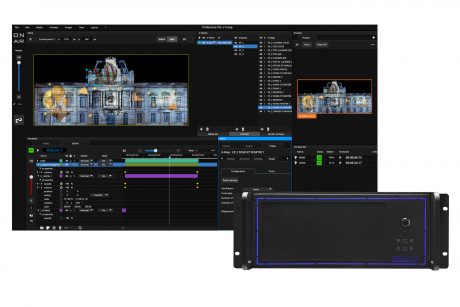
PARIS – Modulo Pi is pleased to announce the immediate availability of Modulo Kinetic version 4. Through this biggest release ever, the fully integrated media server solution offers a revamped user interface, improved 3D engine, and new extensive capabilities dedicated to virtual productions.
Designing the next generation of media server solutions, Modulo Pi is pleased to announce the official and immediate release of Modulo Kinetic V4. Introduced in 2016, Modulo Kinetic makes a major step forward in its development with a variety of new features and improvements.
More details from Modulo Pi (www.modulo-pi.com):
New look and feel
The Modulo Kinetic Designer offers a revamped user interface with new icons, optimized views, toolbars, timelines, nodal programming editor, and more. Special attention was paid to the 3D scene viewer to offer users a smooth navigation and polished experience with the software.
New formats and protocols supported
Version 4 includes the support of Notch Block, 10-bit Apple ProRes, and 10-bit GoPro Cineform. Modulo Kinetic also supports LUT format, allowing creative filters and real-time color grading.
Modulo Pi’s media server further expands its interactivity possibilities. With support of the WebSocket protocol, it is now possible to create custom web applications, and interact with shows created in Modulo Kinetic from a smartphone, a touch screen, or any other computing device.
Improved 3D engine
Modulo Kinetic V4 includes a large series of improvements to its embedded 3D engine.
New features allow to significantly enhance show study and simulation in Modulo Kinetic.
The already existing internal database of video-projectors has been updated to reach +680 references.
Projectors can be easily imported into Modulo Kinetic Designer from a csv file. Their distribution in 3D scenes is much faster and easier thanks to a new clone and symmetry tool.
Detailed study documentation can be created directly in Modulo Kinetic. Users are offered the ability to add measures or annotations to 3D scenes, and effortlessly export any view and information required: 3D view snapshots, lux and pixel density views with captions, pdf list of video-projectors with their information, and more.
In addition, Modulo Kinetic upgrades its rendering with the support of spotlight and pointlight shadows.
It is also possible to render camera, projector, or mesh instance in a timeline layer with post-process Reflection, Ambient Occlusion (SSAO), Depth of Field (DOF), Glow and advanced Antialiasing.
New capabilities dedicated to virtual productions
Modulo Kinetic V4 offers a series of new features and enhancements to address the need for virtual and hybrid events in the context of the Covid-19. Compatible with green screen and LED screen configurations, these new capabilities are tailored to Pro AV companies considering XR projects.
A greatly improved chroma keyer is available for green screen productions.
Modulo Kinetic supports SteamVR tracker, as well as FreeD and Stype protocols. It also integrates FreeD calibration for the Panasonic AW-UE100 and AW-UE150 PTZ cameras, as well as pose calibration and intrinsic calibration of fixed cameras.
Moreover, Modulo Kinetic features multi-zoom camera calibration, and overscan function for cameras and video-projectors in 3D scenes.


